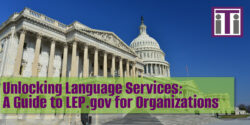
Effective communication is the cornerstone of success for any organization. With the increasing diversity in the United States, it’s crucial for businesses and institutions to provide language services that cater to Limited English Proficient (LEP) individuals. This is not just a matter of courtesy, but also a legal requirement under federal law. LEP.gov is a vital resource for organizations to understand their obligations and the government translation resources available to them. In this article, we’ll explore how organizations can leverage LEP.gov to meet their language service requirements, understand their rights, and access valuable resources.
Understanding LEP Individuals and Your Legal Requirements
LEP individuals are those who do not speak English as their primary language and have a limited ability to read, speak, write, or understand English. Organizations must recognize that providing language assistance to LEP individuals is not optional; it’s mandated by Title VI of the Civil Rights Act of 1964 and Executive Order 13166. These laws ensure that LEP persons have meaningful access to federally conducted and federally funded programs and activities to assist with translation and interpreting services.
Navigating LEP.gov for Compliance
 LEP.gov is a comprehensive portal maintained by the Federal Coordination and Compliance Section in the Civil Rights Division at the U.S. Department of Justice. The site’s mission is to share resources to expand and improve language assistance services in compliance with federal language access laws. Here’s how organizations can use LEP.gov:
LEP.gov is a comprehensive portal maintained by the Federal Coordination and Compliance Section in the Civil Rights Division at the U.S. Department of Justice. The site’s mission is to share resources to expand and improve language assistance services in compliance with federal language access laws. Here’s how organizations can use LEP.gov:
- FAQs and Legal Guidance: The site provides a detailed FAQ section that answers common questions regarding LEP individuals and the legal framework surrounding language access. Organizations can find explanations of relevant laws, definitions of LEP, and the requirements for language services.
- Federal Agency Language Access Plans: LEP.gov hosts updated language access plans from various federal agencies. These documents serve as models for organizations looking to develop their own language access strategies.
- Resources for Law Enforcement and Courts: There are specific resources for law enforcement agencies and courts, such as letters regarding language access and fact sheets that outline best practices for ensuring language access in legal settings.
- Technical Assistance Documents: Organizations can access technical assistance documents that provide information on language access in digital portals and data collection systems, helping them to comply with Title VI requirements.
- I Speak Cards and Language Posters: LEP.gov offers “I Speak” cards and language posters that can be used to identify the language preferences of LEP individuals and facilitate communication.
- Data and Language Maps: The site includes data and maps that help organizations understand the linguistic landscape of their service areas, enabling them to plan language services accordingly.
- TIPS Series and Interpreters: The TIPS series provides practical advice on various aspects of language access, including the use of interpreters and interpretation services.
- Language Access Laws and Policies Archive: An archive of language access laws and policies is available for organizations to research historical and current standards in language services.
Best Practices for Organizations
To effectively use LEP.gov, organizations should:
- Conduct a Needs Assessment: Evaluate the demographics of the population served to determine the extent of language services required.
- Develop a Language Access Plan: Use the resources on LEP.gov to create a comprehensive language access plan that outlines how the organization will provide services to LEP individuals. At iTi, we have assisted many of our clients in creating such a plan.
- Train Staff: Ensure that all staff members are aware of the legal requirements and trained in providing language assistance. iTi provides training for our clients in how to work with professional interpreters, offers language proficiency assessments, and can even train bilingual staff to become qualified interpreters.
- Monitor and Evaluate: Regularly review and update language services to ensure they meet the needs of LEP individuals and comply with legal standards.
Conclusion
LEP.gov is an invaluable tool for organizations seeking to navigate the complexities of language services requirements. By understanding their legal obligations and utilizing the resources available on the site, organizations can ensure that they are providing meaningful access to their services for LEP individuals. In doing so, they not only comply with the law but also embrace the diversity that enriches our society.
This blog post serves as a starting point for organizations to explore LEP.gov. For a more in-depth analysis and tailored language services solutions, organizations should consider consulting with a professional language services company like Interpreters and Translators, Inc.
| Talk to an Expert |
Interpreters and Translators, Inc. is a full-service language solutions company based in Glastonbury, Connecticut. iTi is an NMSDC-certified minority owned business.






Comments are closed here.